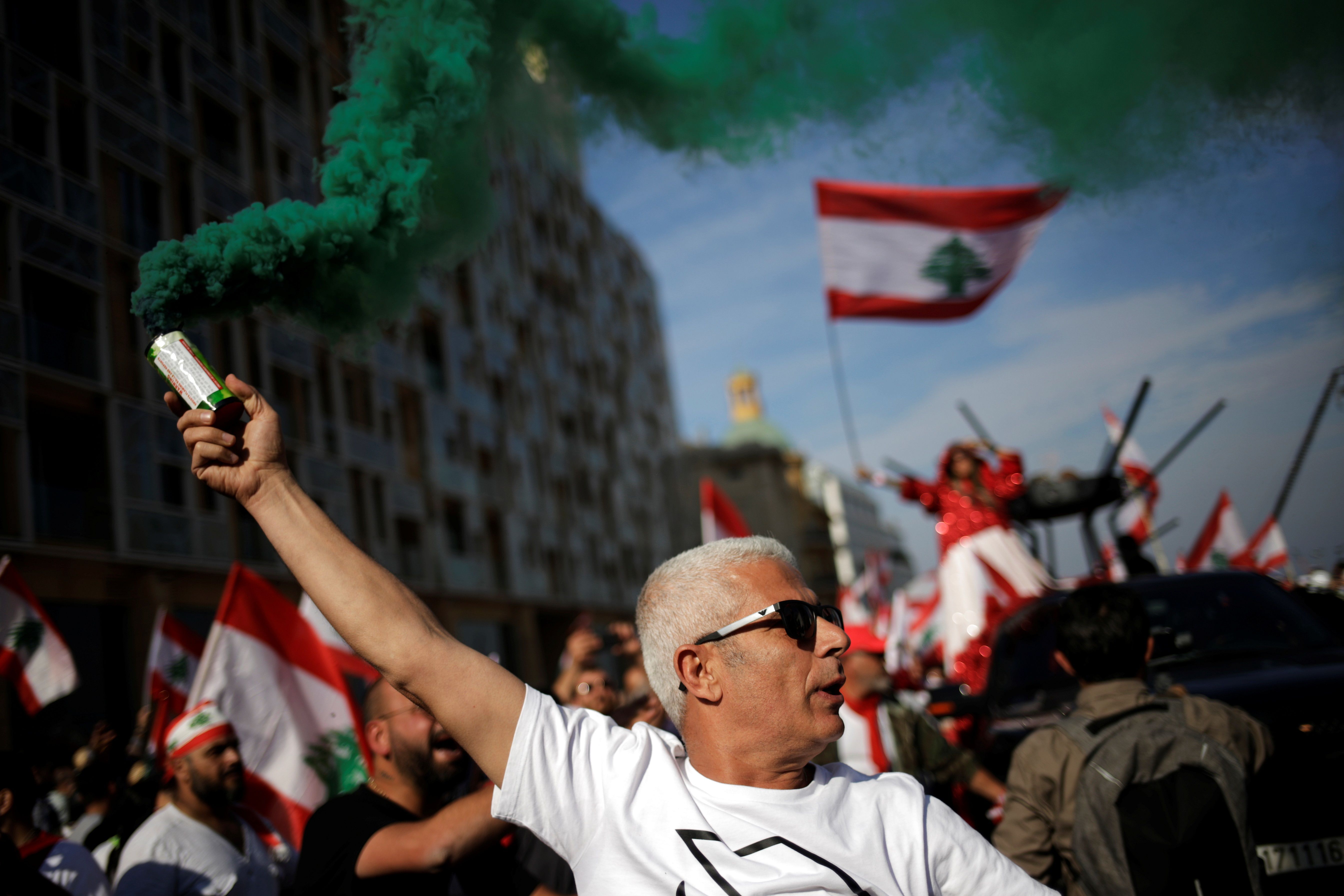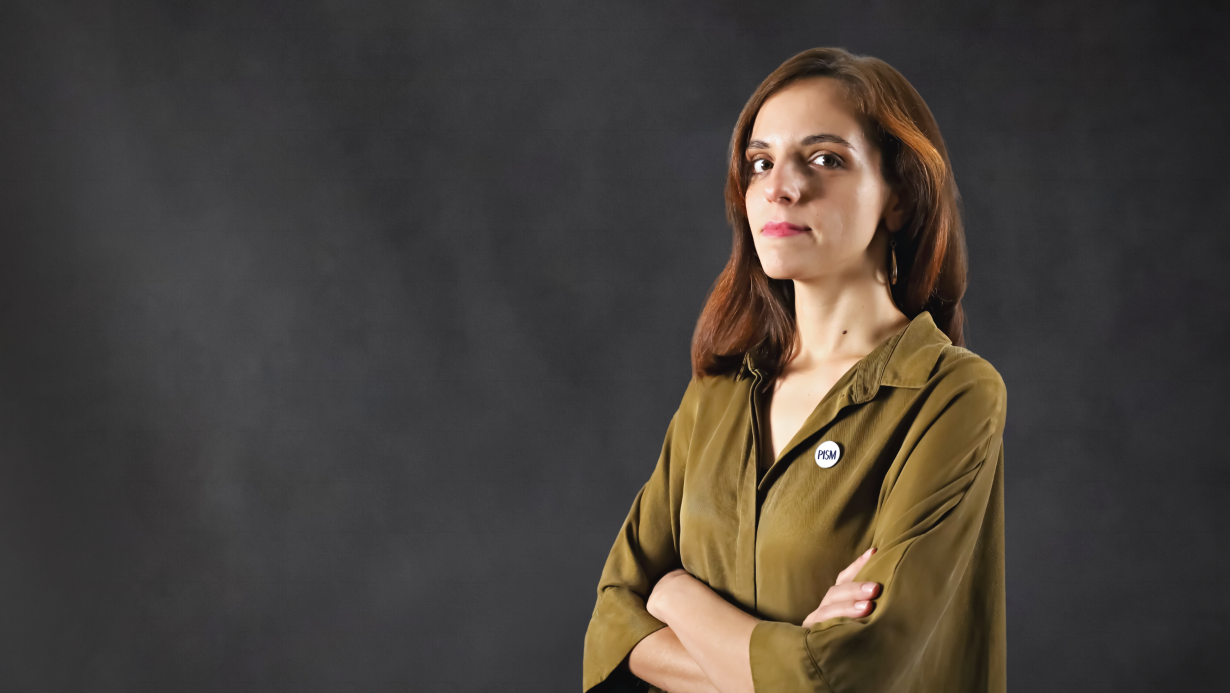Reforms Prospects in Lebanon in Light of the Mass Protests

The Protests and the Authorities’ Reaction
The protests began on 17 October after the government proposed increasing taxes on gasoline and tobacco and a new tax on calls made through the WhatsApp mobile phone application to bring in additional revenues for the 2020 budget. According to estimates, the anti-government manifestations gathered over a million people (nearly a fifth of Lebanon’s population). The demonstrators see the country’s model of consensus democracy as a source of corruption and incompetence in the government, though until recently it had been a guarantee of peace. The model’s purpose is to ensure parliamentary representation of all the religious groups present in Lebanon and to assign political functions to the members of specific religious communities—the prime minister must be a Sunni Muslim, the president a Christian Maronite, the speaker of parliament a Shiite. This sectarian form of government, though, has enticed foreign entities to fight for influence in the country, a result also criticised by the protesters. The Sunni PM traditionally has close relations with the royal family of Saudi Arabia. In turn, the Shi'ite Hezbollah gets support from Iran.
The protesters are demanding a technocratic government instead, which will be charged with changing the electoral system and announcing new elections. Responding to the demonstrations, PM Saad al-Hariri proposed a number of reforms, including reducing the remuneration for government and state administration officials, taxing bank revenues, and privatising the telecommunications sector. The PM had hoped that it would lead to the release of foreign funds to help calm the situation—in 2018, during a conference in Paris, The World Bank, European Bank for Reconstruction and Development, France, and Saudi Arabia, among others, pledged to provide Lebanon with $11 billion in support provided that the government works on improving the country’s economic situation. However, Hariri did not manage to sway the foreign donors nor to calm the protests, and so he resigned on 29 October. Following President Michel Aoun’s consultations with MPs, the former Finance Minister Muhammad Safadi emerged as a candidate for PM. Nevertheless, he withdrew because of the protests and difficulties trying to establish a new cabinet. Until a new PM is appointed, Hariri remains in office as the interim head of government and has declared his willingness to chair the future cabinet of experts.
Economic Problems
The protests are the aftermath of ineffective economic policy and the public’s disappointment with the ruling elite. Lebanon’s public debt was 155% of GDP—the fifth-highest in the world. According to forecasts, the country’s economic growth in 2019 will not exceed 1%. Power outages are common and more than 25% of Lebanese live below the poverty line. Inefficient tax policies are mostly to blame, with tax collection at the top of the list, as the country’s revenue from taxes amounts to only 14% of GDP (compared to 36% for OECD countries). Until 2017, the corporate income tax was 15% (currently 17%) and VAT was only 11% (until 2018, 10%). Another problem is income inequality, with the income of Lebanon’s wealthiest 1% accounting for 25% of its GDP.
The war in neighbouring Syria also has had a negative impact on Lebanon’s economic situation. In the country of 6 million, there are 1.5 million Syrian refugees. The weak Lebanese economy cannot provide them with a sufficient number of jobs and housing.
The Problem of Hezbollah
The participation of Lebanese Shiites (most of whom back Hezbollah) in the protests indicates that this group has also begun to blame the party for the state’s problems. Its image as a grassroots, anti-establishment Shia party has lost credibility. Hezbollah leader Hasan Nasrallah has urged his supporters to stop demonstrating. He criticized the idea of new elections, arguing they would delay the release of the $11 billion in foreign investment and the necessary economic reforms. He also called for Hariri’s return as PM, but in a mixed government of politicians and experts.
Hezbollah is supported by Iran, which has a key impact on politics and stability in Lebanon. In 2016, Aoun, who supports the party, at the time was the country’s newest president and appointed members of the 8 March Alliance, a parliamentary coalition led by Hezbollah, to 17 out of 30 ministerial positions. In the 2018 parliamentary elections, the Alliance won 80 out of 128 seats. Hezbollah runs hospitals, schools, and institutions providing social support. Its militias are better armed than the Lebanese army. Iranian support, military power, and social assistance system make Hezbollah an administrative structure parallel to the Lebanese state. Thus, Hezbollah is an important factor in shaping Lebanon’s foreign relations. Saudi Arabia, which competes with Iran for dominance in the Middle East, supports Hariri’s party (Saad al-Hariri even has Saudi citizenship) and views Hezbollah as a threat to Saudi influence. Hezbollah is also an important player in the Israel-Iran conflict. Its strong military presence in areas near the Lebanese border with Israel increases the hostility between the two countries. This is important in the context of the UNIFIL peacekeeping mission, which aims to prevent the resumption of the Lebanon-Israel conflict.
Hezbollah’s influence is also worrisome for the U.S., which has transferred $2.3 billion since 2005 to strengthen the Lebanese army as a counterweight to the party’s military power. In November, the U.S. suspended this support, claiming that funds may have been funnelled to the Hezbollah militias. The U.S. also imposed sanctions on party representatives and the Lebanese Jammal Trust Bank, claiming that it is involved in financing Hezbollah.
Conclusions
The actions of Lebanese politicians indicate that they seek to wait out the protests and maintain power. While Hariri portrays himself as the only guarantor maintaining the difficult political compromise—in 2018, forming a government took nearly nine months—Hezbollah opposes new elections, fearing losing its dominant role in the government. The party also has the most tools to escalate the situation to defend its influence (i.e., by using its militias to suppress the demonstrations). The difficulties in forming the cabinet and Hezbollah’s strength make new elections unlikely and thus reduce the chances that Lebanon will change from its consensus democracy model.
At the same time, the demonstrations uniting different ethnic and religious groups have created the biggest opportunity in years to force the government to initiate economic reforms and create a technocratic cabinet. Lebanon needs financial and technical support to implement the reforms and stabilise the situation. The EU can maximise its neutral position and France’s favourable attitude towards reforms in Lebanon to initiate a dialogue between the protesters and the government. This could prevent regional powers from using the political stagnation (no parliamentary meeting has taken place since the start of the protests) to enhance their influence. The EU can also provide financial assistance, conditioning it on the government increasing its fight against corruption and on actions improving the Lebanese tax system to shift the burden away from the poor. The EU might also fill the gap created after the U.S. suspension of aid to the Lebanese army. A weakened army means a further increase in the role of Hezbollah militias and, as a consequence, stronger Iranian influence. This threatens the goals of the UNIFIL mission, in which nearly 250 Polish soldiers are involved, by intensifying the conflict with Israel, which sees Hezbollah as a direct threat.
The deteriorating economic conditions in Lebanon are also affecting the situation of the Syrian refugees in Lebanon. Poland is helping the Syrians and Polish humanitarian organisations are operating in the north of the country. In February 2018, the Polish authorities declared the transfer of $10 million for the construction of housing for the Syrian refugees. These activities are in line with the objectives of EU migration policy, which aims to address the root causes of migration from the region through local involvement.


